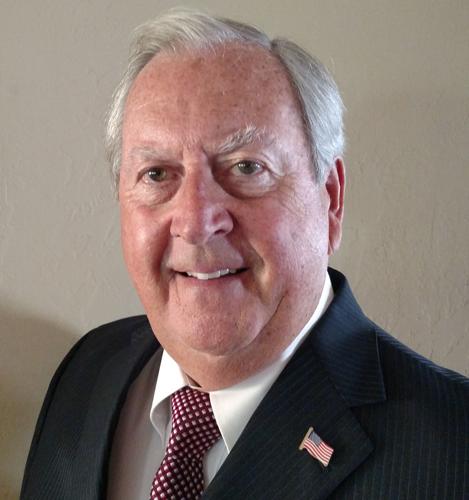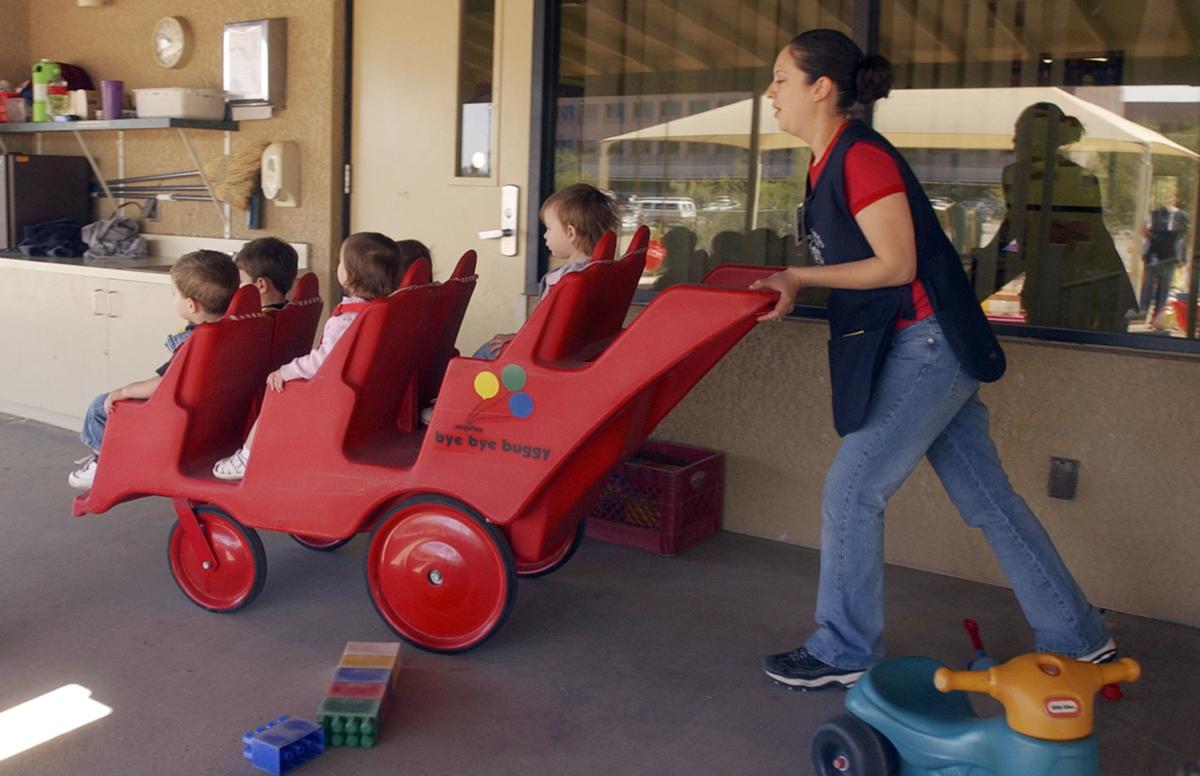The Star’s front page headline — “Carondelet to shutter 2 longtime child-care facilities” — was for me a very sad story about a health-care organization with over a century of service in our community losing some of its purpose and mission.
These child-care facilities have been on the campus of St. Mary’s and St. Joseph’s hospitals for some 25 years and 30 years respectively. Each was developed by a forward-thinking administration working with a fully supportive community board dedicated to family and employee values. These two facilities were dedicated to one simple purpose: to provide a quality child-care experience for children of hospital employees who, in the late ‘70s and early ‘80s did not have many options for quality child-care.
Casita Maria and Casita Jose, the Carondelet child-care centers, were staffed with certified teachers who were tasked with curricula development and the teaching of the preschool children. They were supported by other staff who attended to the children’s physical needs. Formative education was provided to all children based on their age group. It was not a “baby-sitter” service, but rather an educational facility that happened to provide child-care in an innovative manner.
Parents working at the hospitals along with parents from the community at large loved the concept and reserved their places well in advance of the centers’ opening. Most often, there was a waiting list. The two facilities had a capacity of up to 200 infants and preschool children — roughly 100 at each facility. Casita Maria and Casita Jose became well known in Tucson and were recognized nationally as a model within the health-care industry. Their mission served the child-care needs of both hospital employees and community families alike, providing an option for both early child education and child care.
The Star quotes Carondelet CEO Mark Benz saying, “Carondelet routinely evaluates employee benefits and has made the decision to no longer offer child-care services. We are offering assistance to connect families with local providers for services.” Indeed, any business should look at its employee benefits along with all expenses on the financial statement that affect the profitability and bottom line.
The difference between a nonprofit organization, which Carondelet previously was, and the for-profit organization, Tenet Healthcare, which now owns Carondelet, is found in the values of what’s important to people.
When seven Carondelet Sisters trekked in 1870 from San Diego to the Old Pueblo we now call Tucson, they were responding to the call of then Bishop Salpointe “to educate the poor children.” Soon, the Bishop and the good Sisters discovered another major need existed in the community — taking care of the sick — which they did with the opening of St Mary’s 12 bed infirmary in 1880. While that healthcare mission continues today the decision-makers at the Tenet organization are very different from the Sisters who preceded them.
The for-profit orientation first and always considers the financial bottom-line and, most importantly, the effect on shareholders. Carondelet’s shareholders are the people of Tucson and southern Arizona. Programs such as child-care services are intrinsically not money-makers. They are intended to “break even” but at the same time are dedicated to the hospital employees and the community as well. In the for-profit organization, these kinds of services are typically “the first to go” when their financial contribution to the bottom line is deemed to be weak or marginal.
I would suggest that while the bottom line is financially important to any organization (including nonprofits), so also is the myriad of programs and services which the sick and non-sick receive through hospitals. These services are mostly paid for, but often times given as part of the hospital’s broader mission and values.
The Sisters’ philosophy of “total care” embodies those values and has been consistently present in all of their work for some 136 years until the change in ownership two years ago. Those values have been the face of Carondelet hospitals and the Sisters of St Joseph of Carondelet’s ministry in Tucson for over a century. It is sad to see that mission tarnished and caught up in high finance decisions that do not look at the whole equation, only the dollars.With regret, I see in the closure of these facilities the abrogation of the long established Carondelet values and its unequivocal commitment to Tucson and Southern Arizona.
It signals a significant change from a values-driven philosophy of operation to a bottom-line orientation where the shareholder impact is the reason to do or not do something. The shareholder benefits (or doesn’t) from these decisions made sometimes at the expense of and the disenfranchisement of people in need.
Our great civic community organization, The Centurions, realized a couple of years ago that times were a-changing. In my opinion, they appropriately decided to redirect their hard-working fund-raising efforts away from the new for-profit ownership (Tenet Healthcare) to the wider civic community. The Centurions Charter likewise embraced philosophical values different from the new ownership and management. And so, they redirected their energies.
So, a philosophical and not at all subtle shift in mission values as a result of ownership change has visited the Carondelet hospitals and now drives the direction of a for-profit, bottom-line orientation. You might ask, “What’s next?” Will a financial reason be found to lessen care and services to the marginalized and disenfranchised of our community who cannot afford to pay?
If we extrapolate this new direction and fast forward, we may well begin to see that the “element of total caring” is beginning to wither. What was once a “sacred trust” between health-care providers and the community is now being forgotten and replaced with a much-less-sensitive operating philosophy that deals strictly with numbers — not the lives of people and their needs.When I was asked in 1979 to become the first lay-administrator of St Mary’s hospital in 100 years, I resonated with the mission values and deep concern for all, It was palpable…a hospital that took care of folks in so many ways.
The employee associates were engaged at all times in delivering on that mission and philosophy of care and service in caring for all people whom they were privileged to serve. That became my compass and guided me personally in my work, along with our community board and indeed our Sisters who made this their hallmark for all time. We always asked the questions, “What is best for the patient?”… “What is best for the family? ... And, “What is best for our community?”
In 1983, we merged St Marys and St Josephs and subsequently acquired Holy Family Hospital in Nogales forming the Carondelet Health Network. While many jobs changed (including mine) the new organization continued to embrace the same values dating back to 1880. Yes, our business skills required us to be financially savvy and to assure operational solvency in this nearly $1 billion new healthcare delivery system.
The good news is that solvency came but it was not balanced on the backs of those we served. The differentiating and critical decision-making piece of all that we were about, always returned us to our roots and mission. Carondelet said YES to many important healthcare patient care and services. Carondelet said YES in developing the community’s first burn care unit which was strongly supported by our Tucson Firefighters to supplement the much needed and highly expensive care of burn patients. Carondelet said YES to the Tucson Hospice, then the only alternative for hospice care in the community. It was underwater and needed a sponsor to continue its mission.
Carondelet preserved that service within the community and opened the Carondelet Hospice Program back in 1983. Indeed, we too struggled with the potential negative financial impact on our bottom line but the conclusion was, “it’s the right thing to do for our community.” When the much needed community healthcare mission of El Rio Community Health Center was financially struggling, Carondelet said YES and helped that organization return to solvency so that it could deliver its mission. It eventually became the 25th largest Federally Qualified Health Clinic in the nation with an annual budget of over $140 Million and a separate Foundation for fund development.
Thirty-five years later El Rio is strong, viable, and a source of pride in our community. They are driven by a philosophy of caring which they embody as part of their mission and values for those in need. And, oh yes, Carondelet said YES years ago to programs like child-care because they were part of and contributed to this mission-driven organization. At the time, the critics on the sidelines wondered why we were doing such things…the answer was quite simple…”It is part of who we are.”
I was privileged to be a part of this caring and dynamic healthcare organization for some 14 years. Those were some of the most fulfilling years of my life and career! As a now-retired health-care executive, I should like to ask CEO Benz to go deeper in this important decision. Go deeper please, Mark, in the assessment that places values and caring for others (not only patients) in the decision-making equation. Go deeper in reflecting on the faces of your employee associates who have come to rely on Casita Maria and Casita Jose for their children. Go deeper, my colleague friend, in thinking about what is the humane and right thing to do. The equation is much bigger than the bottom line.
And finally, Mark, may you and your Tenet Healthcare organization come to realize that this decision to shutter the child-care centers is far bigger than what its financial contribution is to the real bottom line: patient care, family care and child care for the employees and the community.
While I understand your statement that, “Carondelet routinely evaluates employee benefits,” I would respectfully suggest that in your financial assessment to date you have lost your human compass. You have, for business reasons, become insensitive to needs far greater than the proverbial bottom line. You and your for-profit company have apparently “set aside” the core mission and values of Carondelet begun by the Sisters so long ago.
Indeed helping employees achieve a meaningful work/life balance fits that mission and broadens it to include “treat children with respect, dignity and love” which is another facet of Carondelet’s long standing presence in our community. Simply, it traces back to the beginnings when seven Sisters combined their education ministry with their healthcare and social justice ministries and said YES in responding to all who are in need.I sincerely hope that that the Carondelet Sisters’ rich history of caring for our community will not be lost in Tenet’s decision to close down the child-care centers. You see, the real shareholders are the Carondelet employees, their families and the community who have come to rely on the child-care centers for a quality experience for their children.
Choose wisely; do the right thing and do things right! Please un-shutter the Carondelet child-care centers. They are another source of pride in our community!







